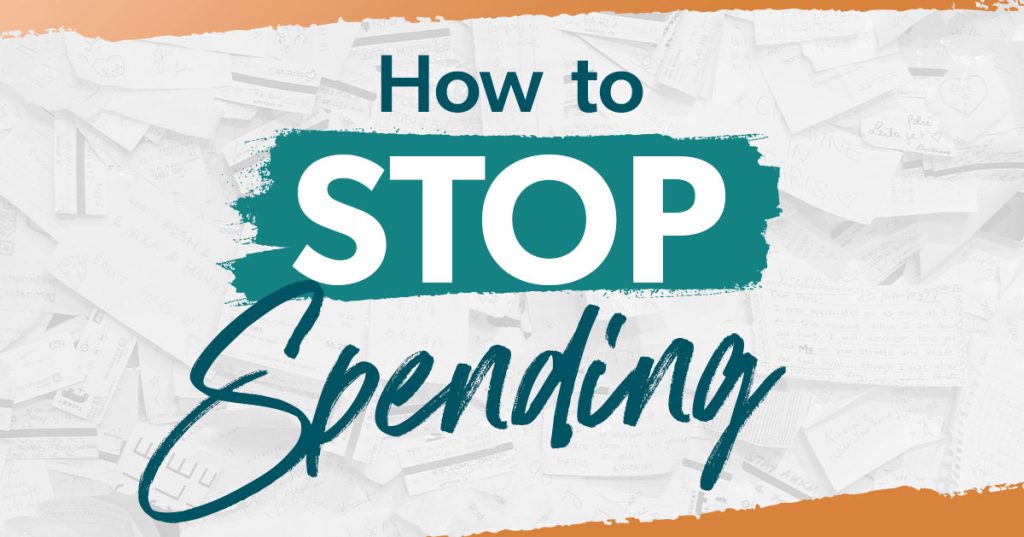I get it—overspending is a real struggle.
No matter where or how you shop, spending money on random stuff is always a temptation (I’m looking at you, $100-Target-run-disguised-as-a-quick-trip-for-shampoo).
So, how do you keep from busting your budget?
I’m here to share my best tips for how to stop spending money—so you can stress less, save more, and make faster progress toward your money goals.
How to Stop Spending Money: 16 Tips to Stay in Control
1. Identify your spending tendencies.
If you want to learn how to not spend money, you need to start with your money mindset. It’s important to know your spending tendencies (or as I call them, spendencies).
Are you naturally wired to be a spender or a saver? Are you a nerd or a free spirit? Do you value safety or status? All these factors and more can directly influence your spending habits. And the more aware you are of your spending temptations, the more likely you are to guard yourself against them.
2. Create a budget.
A budget is the key to fighting overspending. Because if you have a spending plan for the month ahead, you’re more likely to stay on track.
Start by listing your monthly income, followed by all your monthly expenses. Be sure to include the basics (starting with food, utilities, housing and transportation) before you budget for things like entertainment or clothing. Then subtract your expenses from your income.
The goal is for this number to equal zero—this is called a zero-based budget. You want to make sure every single dollar you make goes toward giving, saving, spending or paying off debt. A zero-based budget is how you get your spending under control.
If you’ve never budgeted before, you might be surprised by how much money you’re spending each week (or even each month) on little things—like coffee, lunches or that snack shop at work that your spouse doesn’t know about.
And give yourself some grace. It usually takes a few months to make your budget work for you. Then you can keep fine-tuning your budget to cut costs and trim down your spending even more.
3. Set money goals.
Having a specific money goal you’re working toward is a great way to motivate yourself to stop spending money. Because every dollar you spend is one less dollar you can put toward the bigger thing you want.
Your goal could be to pay off debt, save for a car, or go on a debt-free vacation. Whatever it is, make it specific. Even better if you have a visual reminder you can put on your fridge or in your wallet. That way, every time you’re tempted to buy something, you have to decide if it’s worth delaying your goal for.
4. Track your spending.
It doesn’t matter how large (or small) your income is—if you’re not tracking your spending, you’ll never be in control of your money. In fact, you’ll always feel like your money is controlling you.
And while making a budget is important, you also have to stick to your budget by tracking your expenses throughout the month. Every single expense. This will help you know how much you have left to spend. Plus, it makes you more aware of where your money is actually going.
5. Do a no-spend challenge.
Want to know the best way to stop spending money? Doing a no-spend challenge! This is where you commit to only buying the bare necessities for a certain period of time. And hey, this is actually more fun than it may sound.
Challenging yourself to spend as little as possible for an entire month forces you to be super intentional with your spending. Plus, it helps you see what you can actually live without.
6. Avoid restaurants (and food delivery apps).
One of the biggest areas we overspend on is food. We all know that eating out gets expensive—fast. If you’re spending $15 on lunch five times a week, that’s $75 a week (and $300 a month). And don’t even get me started on food delivery app fees!
Deciding to cut out (or at least cut back) on eating out is a huge way to keep yourself from spending too much money. I’m not saying you shouldn’t ever treat yourself to Sunday brunch or a nice dinner on a special occasion—just scale it back some and make sure it’s in the budget.
7. Plan your meals.
Speaking of not eating out, planning your meals in advance can help you lower your overall food costs. And it doesn’t have to be complicated!
Choose a couple of recipes for the week, head to the store with your list, and set aside some time to prep or cook your meals. Then the next time you’re tempted to hit up the drive-thru after a long day, you can say, “We’ve got food at home!”
8. Use the envelope system.
One way to keep yourself from overspending is to use the cash envelope system. Here’s how it works: You choose specific budget lines (like groceries, gas, personal), label individual envelopes with those lines, and then put cash (yes, physical cash) into each envelope.
The envelope system is helpful for a couple reasons: 1) You tend to spend less when you use cash than when you use a card, and 2) you can only spend what you’ve budgeted in your envelope. When the money is gone, it’s gone! It’s a great way to keep you disciplined with your spending.
9. Swear off debt.
If you really want to stop spending money you don’t have, you need to swear off borrowing money (aka debt). The truth is, debt steals your income. One purchase you make today can keep you trapped in payments (and interest) for months or years to come. Your debt owns you until you pay it off.
Here’s the deal: If you don’t have the cash to pay for something right now, you can’t really afford it. So, if you’re serious about getting your spending under control, go ahead and cancel your credit cards. Take debt completely off the table. Because without credit, overspending isn’t even an option!
10. Find alternatives to retail therapy.
We may sometimes joke about being a shopaholic, but compulsive spending, otherwise known as retail therapy, is a real thing. We buy something because we want it now. We add it to our cart before we think about what’s in the checking account (or before considering our financial goals, for that matter).
But instant gratification isn’t all it’s cracked up to be. Spending money doesn’t actually make you feel better . . . especially when you see your bank account shrinking right before your eyes.
So, instead of trying to spend your feelings away, work out what your emotions are really telling you. Or find other things you can do besides spend money: Move your body, talk to a friend, or do a task you’ve been putting off.
11. Resist sales.
Who doesn’t love a good deal? I know I do! Retailers know how to lure their customers with a flashy (and perfectly placed) sales rack. But how much is all this saving really costing you?
If you buy a sweater you were never going to buy just because it’s 25% off, you’re actually paying 100% more than you would have. So, if you see an item on sale that you weren’t already planning to get, it wasn’t meant to be (preaching to myself here too).
And if you can’t stop thinking about something, add it to your budget for next month (most likely, there’ll be another sale).
12. Limit social media comparison.
Picture this: It’s Saturday morning, and before you realize it, you’re scrolling through your social media feed to catch up on what your friends are up to. Not even two swipes in, you’re bombarded with a post of an influencer making their morning latte—complete with a high-end coffee machine, aesthetic mug and expensive milk frother. Suddenly you’re thinking, Wait, maybe my mornings would be better if I had that espresso machine.
Social media makes the comparison game even more intense. Your friend’s post about their brand-new couch with those perfect throw pillows. That popular blogger’s reel about the incredible, all-inclusive resort she went to. It can make us feel like our lives aren’t good enough and we need to spend more money to reach their level. But all that does is drain our bank accounts and steal our joy.
A good question to ask yourself: Would I still want this if no one else ever sees it? You can also cut the comparison by unfollowing those accounts (you know the ones) or limiting your social media use altogether. Trust me, you’ll feel a whole lot lighter!
13. Shop with a list.
We’ve all been there. You make a quick run to Target to get toothpaste and peanut butter. But as soon as you walk through the door, you feel the gravitational pull toward the dollar spot and the clothes section. Just like that, a quick trip to the store for two essentials just got pretty expensive.
Consider this: Instead of heading into a store and wandering up and down the aisles, make a list ahead of time and carry it with you into the store to keep you on track. And if you get caught in the impulse buy scenario a lot, try to avoid the stores that make you spend too much money. (Or maybe send your spouse in for you.)
14. Pause before you spend.
If you’re still having trouble sticking to your budget, ask yourself this question before every purchase: When will I use this?
Take the time to literally imagine how you’ll be using that must-have item a month from now. Will that sweater hold up after a few washes? Will your kids still be playing with that overpriced toy set? Will those shoes go with more than one outfit?
Most of the time, the answer is no. Put it back and save yourself the buyer’s remorse. Otherwise, make it a rule to wait at least 24 hours. By that point, if you still love it and you can fit it into your budget, go ahead and get it.
15. Use what you already have.
It’s crazy how much money we waste buying things we really don’t need—especially when we already have things at home that get the job done.
We eye the beautiful, mint green Kitchen Aid mixer when our own mixer works perfectly well. We think we need a new skin care set when we have a whole basket of unused products under the sink.
Before you add an item to your shopping list, take inventory and see what you already own. Also, what can you repurpose, fix or even borrow from a friend? Instead of buying décor, shop your house and rearrange a room for a fresh look. Rather than spend money on a toy for your kid, pull out board games or unused coloring books.
Making use of what you already have will save you money and help you practice contentment.
16. Find someone to hold you accountable.
It’s one thing to say you’ll stop spending money, but many of us need someone to help us stay on track. Whether it’s a spouse, a friend or even a group chat, tell someone your goal and ask them to check in with you every week or every month.
Maybe your accountability is a financial coach—an expert who can help you navigate your situation and help you get to the root of your overspending. Knowing that you’ll have to report your progress to someone else motivates you to make more of an effort.
And remember, no matter how the next month goes, it’s never too late to change your spending habits. You can always adjust your budget and get back on track at any point. You’ve got this!
Read the full article here










